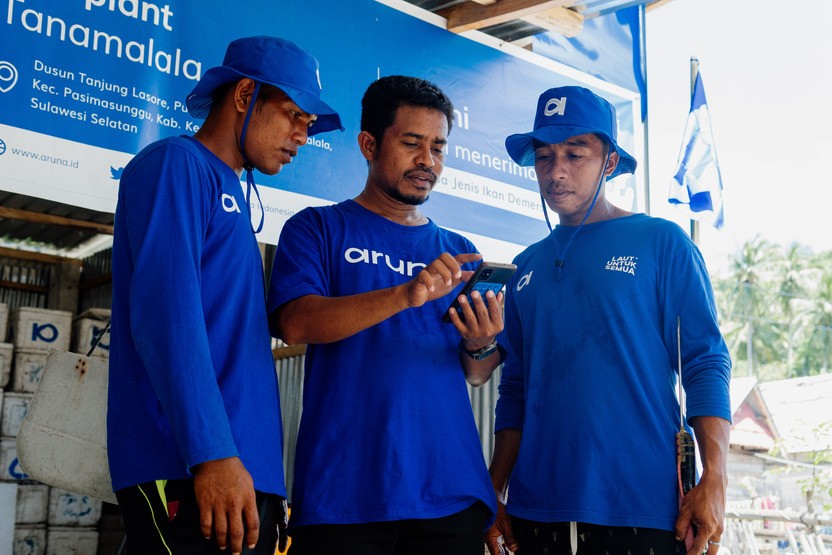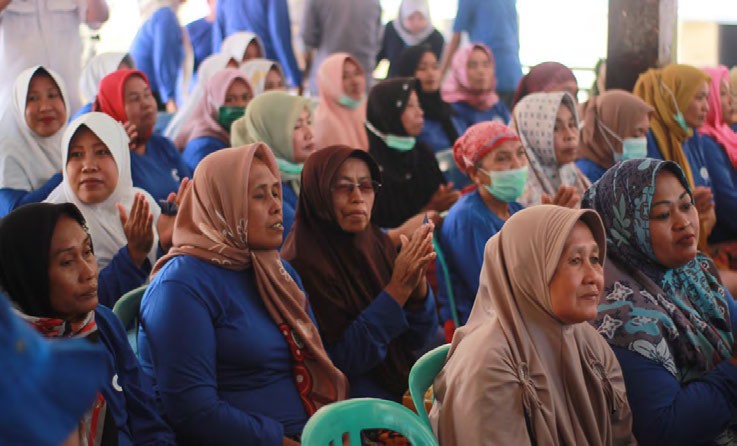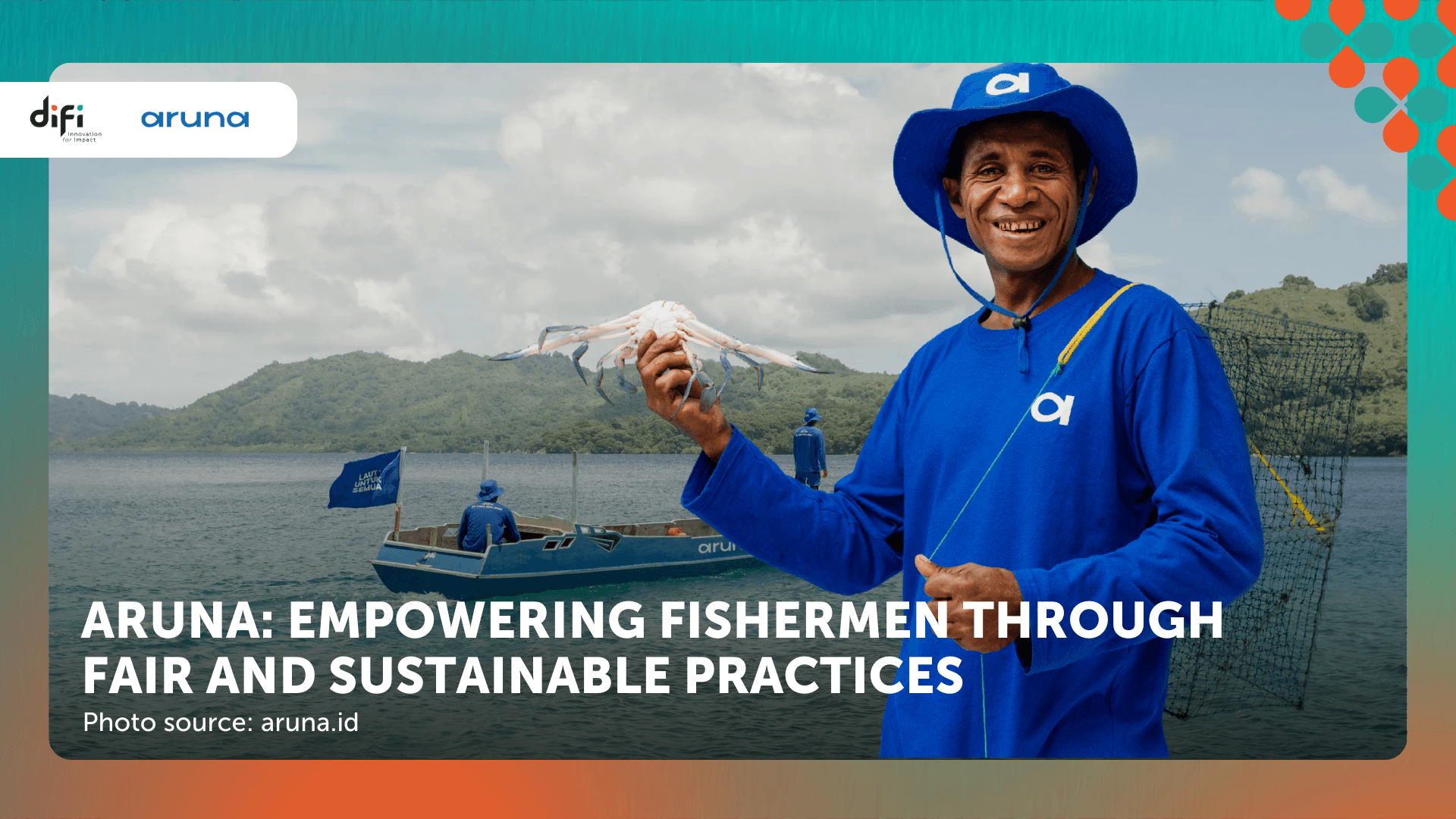By Tessa Febiani
Indonesia is known for its rich maritime resources and offers a fertile ground for fisheries, including shrimp, tuna, skipjack, squid, cuttlefish, octopus, and crab. This has made Indonesia to become the second largest fish producer globally, with the fisheries sector contributing US$26.9 billion annually, approximately 2.6% of the GDP. Fisheries industry supports the livelihood of over 7 million people, equivalent to 3% of the population. It also serves as a primary source of protein, supplying half of the country’s protein consumption.
Despite these contributions, many fishermen in Indonesia remain among the least economically secure. According to data analysis from Survei Sosio Ekonomi Nasional (SUSENAS) in 2017 by Prof. Dr. Zuzy Anna from Universitas Padjadjaran, around 11,34% of those working in fisheries live in poverty—a rate higher than in restaurant services (5.56%), construction (9.86%), and waste management sector (9.62%).
Aruna is Indonesia’s largest integrated fisheries commerce, focused on empowering local fishermen by connecting them to a wider market using advanced technology. Founded in 2016, Aruna’s mission is to make the sea a better livelihood for all, with a vision of making Indonesia as the global maritime axis by 2045. By streamlining the supply chain and bypassing intermediaries, Aruna ensures fair prices for small-scale fishermen, improves their livelihoods, and promotes sustainable fishing practices to protect marine ecosystems.
Connecting Local Fishermen to Global Market
Aruna’s unique business model has become a game-changer in Indonesia’s fisheries sector. Aruna provides traceability, quality control, and access to wider markets, thus improving transparency and accountability in the seafood supply chain. The company’s supply chain includes Aruna Hubs, Aruna Industry Partners, and distribution and warehouse partners that connect customers from around the world with local fisherman and fish farmers, supported by helpers (often women), who process, size, and grade the freshly-caught fish. In addition, there are also Local Heroes, Aruna representatives throughout Indonesia who run various programs for coastal communities and introduce them to the technology that Aruna has developed.

Aruna’s commitment to innovation is proven by its strategic incorporation of Internet of Things (IoT) and data to optimize operations and develop value-added products. By collecting data from fishermen, the platform maps fish varieties and populations across different locations and seasons. Real time data modelling helps to predict international demand based on seasonality, while historical data is used to evaluate fishing performance by location. This approach enables Aruna to identify areas for improvement to support efficient fishing practices.
Sales of fresh seafood and canned meat from local fishermen to the international market are carried out through the wholesale and retail service seafoodbyaruna.com which provides quality products and fast and reliable service for business and retail consumers.
Elevating Coastal Livelihoods and Strengthening Communities
The heart of Aruna’s impact lies in its commitment to providing market access through a digital auction platform, by fostering trade between local fisherman and international buyers. Aruna has empowered over 40,000 fishermen in 31 provinces through more than 150 operational hubs. This has led to remarkable income growth for fishermen, with some experiencing a 3 to 12-fold-rise and earning a minimum monthly income of IDR 3 million (UDS210), which is above the poverty line. Additionally, the digital platform has also created over 5,000 new jobs nationwide and contributed to financial inclusion.
Beyond economic impact, Aruna plays a role in education and community development. Through a series of targeted training workshops, Aruna has provided essential training for fishermen and their families, covering topics like sustainable fishing of fishery commodities, environmentally friendly fishing gears, and household financial management.

In 2022, Aruna trained 505 people, and in 2023, Aruna broke the Indonesian World Record Museum (MURI) in category “The Largest Attended Hybrid Education of Sustainable Fishing for Indonesian Fishers”, by educating over 1,700 fishermen and coastal communities about sustainable fisheries. They are also dedicated to empower women by organizing 41 training sessions, engaging a total of 1,636 female participants, and equipping them with skills in digital marketing, financial management, and quality production to foster self-reliance and financial independence.
Aruna’s commitment to environmental sustainability is shown when the company planted 2,000 mangrove seeds in coastal areas across four provinces and transplanted 40 coral reef seeds in Kepulauan Seribu. Mangrove planting serves a crucial measure to enhance coastal ecosystems and provides numerous ecological benefits such as shoreline protection, habitat for marine life, and carbon sequestration.
Aruna’s innovative approach shows how technology can make a big difference in Indonesia’s fisheries industry by empowering fishermen, fostering sustainability, protecting the environment, and creating more opportunities.
Source:
https://aruna.id/
https://mdiweb.s3.ap-southeast-1.amazonaws.com/MDI_Impact_Report_Aruna_018c34b623.pdf
https://kumparan.com/ahmad-muhajir-1685020387019315623/dinamika-kemiskinan-di-kalangan-nelayan-indonesia-2218tbmWNyb
